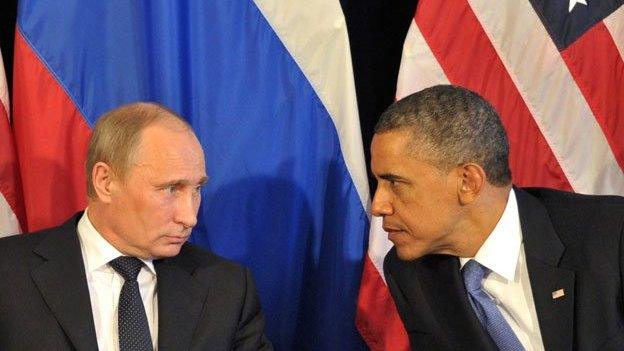At nuclear summit experts talk about strategy - and hope
- Published
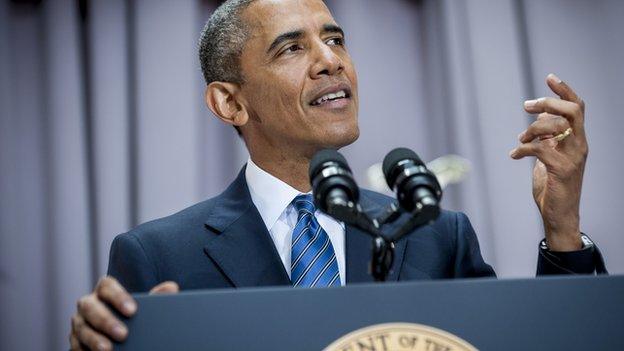
Obama, shown in August, is trying to stop militants from obtaining radioactive material
US President Barack Obama called world leaders together for a nuclear security summit in Washington. They're trying to stop an Armageddon - and dirty bombs.
Footage of a Belgian nuclear official was found in the belongings of a suspect in the militant attacks in Paris in November. Then members of a bombing ring blew themselves up in Brussels, killing 35 people in a March attack, and raised fears about a future attack.
Specifically, security experts worry that members of the so-called Islamic State group or another militant organisation are trying to get a hold of material to make a dirty bomb, a device that uses ordinary explosives to spread radioactive material over a large area.
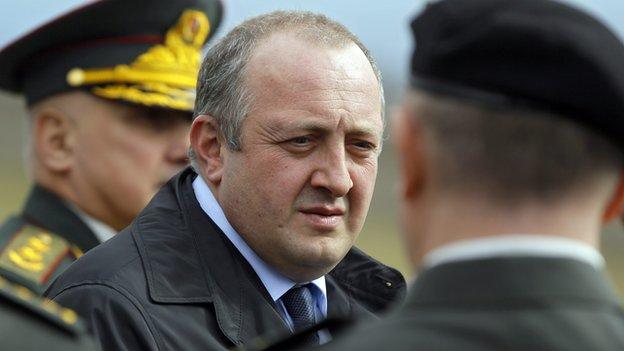
Giorgi Margvelashvili, the president of Georgia, has fought nuclear smuggling
So Obama has turned to leaders such as Giorgi Margvelashvili, the president of Georgia, for help.
They've gathered in hotel suites, embassy receptions and other Washington venues to talk about their efforts to combat IS and nuclear smuggling.
Margvelashvili is an unlikely hero in the global fight against dirty bombs.
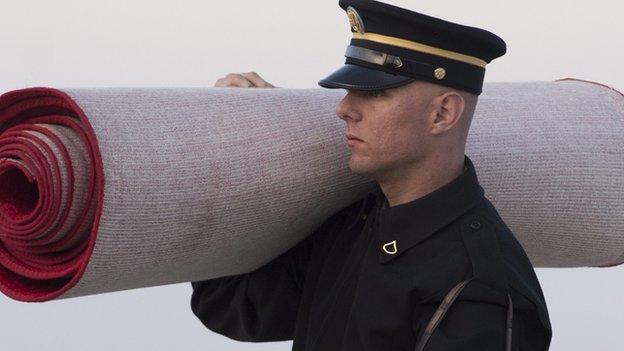
Dozens of world leaders, receiving red-carpet treatment, are attending the summit
Once known for having an abundance of Soviet-era nuclear material, stashed near kindergarten classrooms, in forests and other unlikely places, Georgians have worked hard over the years to secure or eliminate the dangerous substances.
They managed to get rid of all their highly enriched uranium, material that's used for civilian purposes but can be repurposed to make atomic bombs.
And with the help of US funding, they've made a concerted effort to stop people from transporting nuclear-bomb grade uranium and other substances across the border.
The US state department's Eric Lund, who works for the bureau of international security and nonproliferation, says Georgia is one of their "most effective and reliable partners" in the fight against nuclear smuggling.
In fact many who work for the US government have a high opinion about Georgia officials and their efforts to combat militants, especially compared to those in other countries.
When I tell a senior US official I'm going to see Margvelashvili, the American says: "Ask him: What lessons can you give to Belgium?"
The message is clear: Americans are pleased with what he's done to prevent militants from obtaining dangerous substances, the kind that could be used to make a dirty bomb.
And they're worried about Belgium. (US and Belgian officials are now working together to investigate the Brussels attacks, the White House's Ben Rhodes said on Thursday.)
Margvelashvili doesn't answer the American's question about Belgium - at least not directly. As a savvy leader of a nation in the Caucasus region, he knows better than to give unsolicited advice to Europeans.
Instead he speaks in general terms about security precautions that are needed to protect dangerous material.
"That's basically routine," he says, sitting on a couch in a seventh-floor hotel suite with windows that look on to the White House. "But it's a very important routine."
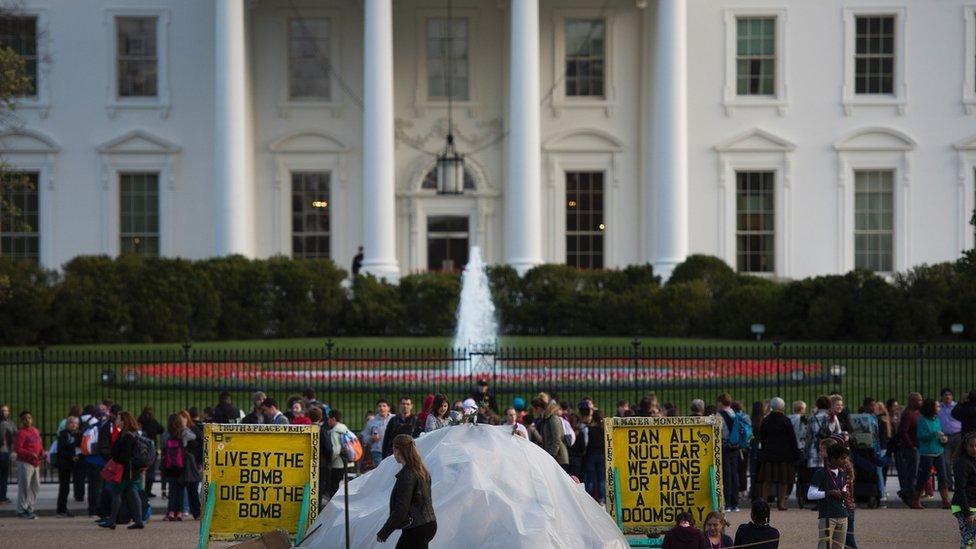
White House officials say world leaders should coordinate efforts on nuclear security
He also talks about the "criminal" element, as he puts it. He says they've prosecuted 23 cases of nuclear smuggling in the last decade: "Fifty people have been arrested."
He's a serious man with thick eyebrows and military-short hair. He walks through the hotel lobby with an entourage of dark-suited men, and bodyguards sit outside the room, eating cashews, during our interview.
When he recalls his early experiences in the US, though, his face softens.
He first came to the US in 1989 or 1990, he says, a time when the Soviet Union was dissolving, and regional dynamics shifting.
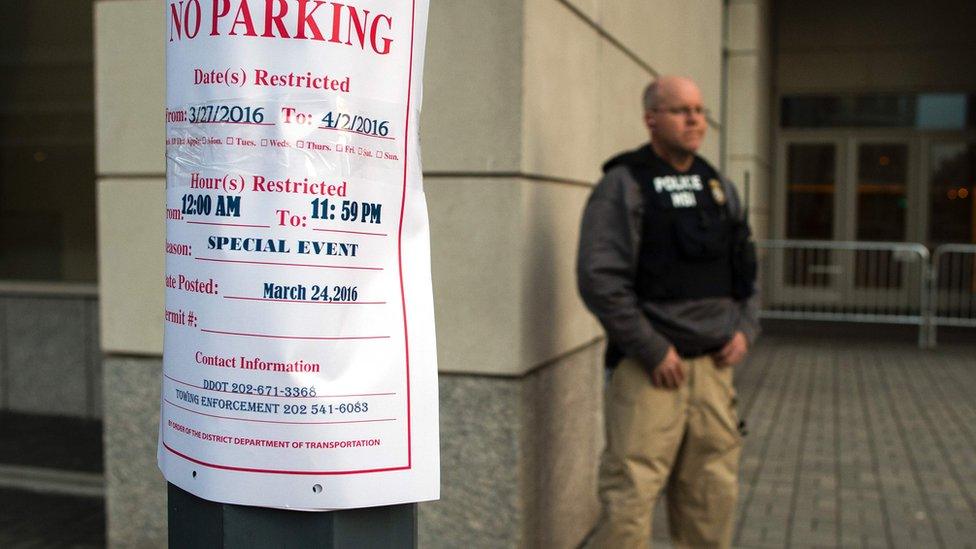
Security is tight for the world leaders and participants at the nuclear summit
"And then to travel," he says, describing a trip he made to Massachusetts. He smiles.
This week, though, he's here to talk about dirty bombs. Nuclear experts at the summit say they're unsure why militants haven't already used one.
"It can't be there's a technical challenge," says Harvard's Gary Samore, a former nuclear adviser to Obama.
Samore says a dirty bomb is relatively easy to make if you have the materials. Still it wouldn't kill a lot of people - at first. Instead it would contaminate an area and cause cancer.
"It's nothing like the immediate effect of a suicide vest in a crowded airport," he says, wondering aloud if that's the reason militants haven't used dirty bombs.
He's chatting with others in a high-ceilinged foyer at the Australian embassy. It's a nuclear cocktail party with Gin Fissiles and Manhattan Projects (whiskey and sweet vermouth).
Aside from radioactive waste, guests talk about a film, The Bomb, external, that'll be shown in New York in April.
One nuclear-policy expert, standing nearby, sips a glass of water. "Gotta stay sober," she tells me.
Drinking strong coffee in his hotel suite, Margvelashvili says an international effort is needed to fight nuclear smuggling. "One country alone cannot deal with this," he says.
Others at the summit, including nuclear-policy experts who've gathered in a nearby hotel, agree that world leaders have to work together to combat the militants.
"The only way to stop them is to have really good nuclear security - and the strictest controls," says Patricia Lewis, a researcher director at Chatham House.
She adds, with a laugh: "And to hope."
- Published31 March 2016
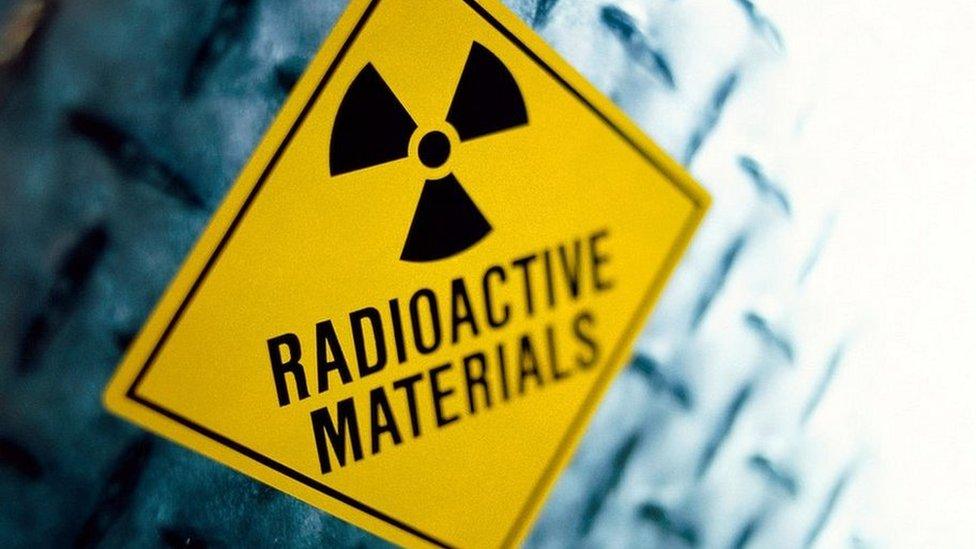
- Published24 March 2014
